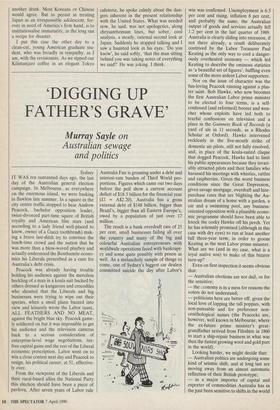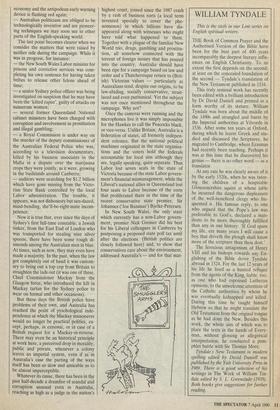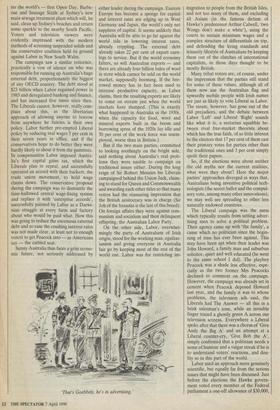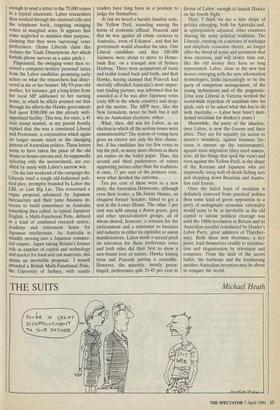`DIGGING UP FATHER'S GRAVE'
Murray Sayle on
Australian sewage and politics
Sydney IT WAS ten suntanned days ago, the last day of the Australian general election campaign. In Melbourne, as everywhere on the enormous island, we were basking in flawless late summer. In a square in the city centre traffic stopped to hear Andrew Peacock, bachelor opposition leader, twice-divorced part-time squire of British royalty and American film stars (and according to a lady friend well-placed to know, owner of a Gucci toothbrush) mak- ing a brave last-ditch try to convince the lunch-time crowd and the nation that he was more than a blow-waved playboy and actually understood the Benthamite econo- mics his Liberals prescribed as a cure for Australia's debt crisis.
Peacock was already having trouble holding his audience against the merciless heckling of a man in a koala suit backed by others dressed as kangaroos and crocodiles who shouted that the Liberals and big businesses were trying to wipe out their species, when a small plane buzzed into view and leisurely wrote the Labor taunt, ALL FEATHERS AND NO MEAT, against the bright blue sky. Peacock game- ly soldiered on but it was impossible to get his audience and the television cameras back to a serious consideration of enterprise-level wage negotiations, tax- free capital gains and the rest of the Liberal economic prescription. Labor went on to win a close contest next day and Peacock to resign, his political career, at 51, effective- ly over.
From the viewpoint of the Liberals and their rural-based allies the National Party this election should have been a piece of pavlova. After seven years of Labor rule
Australia Fair is groaning under a debt and interest-rate burden of Third World pro- portions. Figures which came out two days before the poll show a current account deficit of $18.5 billion for the financial year (£1 = A$2.20). Australia has a gross external debt of $148 billion, bigger than Brazil's, bigger than all Eastern Europe's, owed by a population of just over 17 million.
The result is a bank overdraft rate of 25 per cent, small businesses failing all over the country and many of the big and colourful Australian entrepreneurs with worldwide operations faced with bankrupt- cy and some quite possibly with prison as well. As a melancholy sample of things to come, one of Sydney's biggest car dealers committed suicide the day after Labor's win was confirmed. Unemployment is 6.5 per cent and rising, inflation 8 per cent, and probably the same, the Australian output of goods and services actually fell 1.2 per cent in the last quarter of 1989. Australia is clearly sliding into recession, if not there already, a result deliberately contrived by the Labor Treasurer Paul Keating as the only way to cool a danger- ously overheated economy — which led Keating to describe the ominous statistics as 'a beautiful set of figures', baffling even some of the more ardent Labor supporters.
Nor on the issue of character was the fun-loving Peacock running against a plas- ter saint. Bob Hawke, who now becomes the first Australian Labor prime minister to be elected to four terms, is a self- confessed (and reformed) boozer and wen- cher whose exploits have led both to tearful confessions on television and a place in the Guinness Book of Records (a yard of ale in 11 seconds, as a Rhodes Scholar at Oxford). Hawke intervened recklessly in the five-month strike of domestic air pilots, still not fully resolved, and, in place of the koala-suited claque that dogged Peacock, Hawke had to limit his public appearances because they invari- ably attracted pilots and their families who harassed his meetings with whistles, rattles and raspberries. Given the worst business conditions since the Great Depression, given savage mortgage, overdraft and hire- purchase rates that are blighting the Au- stralian dream of a home with a garden, a car and a swimming pool, any business- oriented opposition with a plausible econo- mic programme should have been able to knock the cocky Hawke off his perch. Yet he has solemnly promised (although in this case with dry eyes) to run at least another full three-year term, in order to groom Keating as the next Labor prime minister. What are we (and in my case, what is a loyal native son) to make of this bizarre turn-up?
Even on first inspection it seems obvious that: — Australian elections are not dull, or for the sensitive; — the economy is in a mess for reasons the voters do not understand; — politicians here are better off, given the local love of lopping the tall poppies, with non-punnable and for preference non- ornithological names (the Peacocks are, however, well known in Melbourne, where the ex-future prime minister's great- grandfather arrived from Fifeshire in 1860 to start a ship-repair business in what was then the fastest growing wool and gold port in the world).
Looking harder, we might decide that: — Australian politics are undergoing some kind of seismic shift, and at long last are moving away from an almost automatic reflection of their British prototype; — as a major importer of capital and exporter of commodities Australia has in the past been sensitive to shifts in the world economy and the antipodean early warning device is flashing red again; — Australian politicians are obliged to be technologically inventive and are pioneer- ing techniques we may soon see in other parts of the English-speaking world.
The last point becomes clearer when we consider the matters that were raised by neither side during the campaign. While it was in progress, for instance: — the New South Wales Labor minister for prisons and corrective services was com- pleting his own sentence for having taken bribes to release other felons ahead of time; — a senior Sydney police officer was being investigated on suspicion that he may have been the 'kilted rapist', guilty of attacks on numerous women; — several former Queensland National cabinet ministers have been charged with corruption and involvement in prostitution and illegal gambling; — a Royal Commission is under way on the murder of the deputy commissioner of the Australian Federal Police who was, according to a television documentary, killed by his business associates in the Mafia in a dispute over the marijuana crops they were jointly, as it were, growing in the bushlands around Canberra; — auditors were searching for $1.2 billion which have gone missing from the Victo- rian State Bank controlled by the local Labor administration. The trouble, it appears, was not dishonesty but sun-dazed, mind-bending, she'll-be-right-mate incom- petence.
Now it is true that, ever since the days of Sydney's first full-time constable, a Jewish tinker, from the East End of London who was transported for stealing nine silver spoons, there have been some rough di- amonds among the Australian men in blue. At times, such as now, they may even have made a majority. In the past, when the law got completely out of hand it was custom- ary to bring out a top cop from Britain to straighten the lads out (it was one of these, Chief Commissioner Mackay from the Glasgow force, who introduced the kilt in Mackay tartan for the Sydney police to wear on formal and other occasions).
But these days the British police have problems of their own, and Australia has reached the point of pyschological inde- pendence at which the Mackay manoeuvre would no longer be practical' politics, ex- cept, perhaps, in extremis, or in case of a British request for a Mackay-in-reverse. There may even be an historical principle at work here, a perceived drop in morality, public and private, whenever a colony leaves an imperial system, even if as in Australia's case the parting of the ways itself has been so slow and amicable as to be almost imperceptible.
Whatever its cause, there has been in the past half-decade a drumfire of scandal and corruption unusual even in Australia, reaching as high as a judge in the nation's highest court, joined since the 1987 crash by a rash of business rorts (a local term invented specially to cover the phe- nomenon) in which billions have dis- appeared along with witnesses who might have told what happened to them. Together with a plague of the familiar New World trio, drugs, gambling and prostitu- tion, all somehow connected with the torrent of foreign money that has poured into the country, Australia should have been ripe for a campaign based on law and order and a Thatcheresque return to (Brit- ish) Victorian values — particularly as Australians tend, despite our origins, to be law-abiding, socially conservative, strait- laced and even puritanical. Yet the subject was not once mentioned throughout the campaign. Why not?
Once the cameras were running and the microphones live it was simply impossible for the Hawkes to call the Peacocks black, or vice-versa. Unlike Britain, Australia is a federation of states, all formerly indepen- dent colonies. But the national political machines originated in the state organisa- tions and the voters hold the federals accountable for local sins although they are, legally speaking, quite separate. Thus Labor lost seven seats in the state of Victoria because of the state Labor govern- ment's financial mismanagement, while the Liberal's national allies in Queensland lost four seats to Labor because of the rorts that proliferated there in the time of the recent conservative state premier, Sir Johannes (`Joe Bananas') Bjelke-Petersen.
In New South Wales, the only state which currently has a non-Labor govern- ment, premier Nick Greiner did his best for his Liberal colleagues in Canberra by postponing a proposed state poll tax until after the elections. (British politics are closely followed here) and, to show that conservatives care about the environment, addressed Australia's — and for that mat- ter the world's — first Open Day, Barbe- cue and Sausage Sizzle at Sydney's new main sewage treatment plant which will, he said, clean up Sydney's beaches and return some sparkle to the nearby South Pacific. Voters and television viewers were evidently impressed with the modern methods of screening suspended solids and the conservative coalition held its ground against Labor in New South Wales.
The campaign saw a similar reticence, practically a vow of silence on who was responsible for running up Australia's huge external debt, proportionately the biggest of any OECD country. The debt stood at $23 billion when Labor regained power in 1983 and deregulated banking and finance, and has increased five times since then. The Liberals cannot, however, really com- plain about this, as the libertarian approach of allowing anyone to borrow from anywhere he fancies is their own policy. Labor further pre-empted Liberal policy by reducing real wages 5 per cent in their seven years in office, and if the conservatives hope to do better they were hardly likely to shout it from the gumtrees. In compensation Labor imposed Austra- lia's first capital gains tax, which the Liberals plan to repeal, and successfully operated an accord with their backers, the trade union movement, to hold wage claims down. The conservative proposal during the campaign was to dismantle the time-hallowed central wage-fixing system and replace it with 'enterprise accords', successfully painted by Labor as a Darwi- nian struggle at every farm and factory about who would be paid what. How this was going to reduce the enormous external debt and so ease the crushing interest rates was not made clear, at least not to enough voter's to get Peacock into — as Americans say — the catbird seat.
Sunny Australia thus faces a grim econo- mic future, not seriously addressed by either leader during the campaign. Eastern Europe has become a sponge for capital and interest rates are edging up in West Germany and Japan, the world's only net suppliers of capital. It seems unlikely that Australia will be able to go far against the world tide in lowering interest rates, already crippling. The external debt already takes 22 per cent of export earn- ings to service. But if the world economy falters, so will Australian exports — and there are already four billion bales of wool in store which cannot be sold on the world market, supposedly booming. If the bor- rowed money has in fact been used to increase productive capacity, as Labor claims, then the resulting exports are likely to come on stream just when the world markets have slumped. (This is exactly what happened in Australia in the 1930s, when the capacity for food, wool and mineral exports built in the boom and borrowing spree of the 1920s lay idle and 30 per cent of the work force was unem- ployed, worse than in Britain.) But if the two main parties, committed to looking soothingly on the bright side, said nothing about Australia's. real prob- lems they were unable to campaign on traditional issues either. During the long reign of Sir Robert Menzies his Liberals campaigned behind the Union Jack, claim- ing to stand for Queen and Commonwealth and awarding each other titles so that many voters had the reassuring impression that the British aristocracy was in charge (Sir Joh of the bananas is the last of this breed). On foreign affairs they were against com- munism and socialism and their delinquent offspring, the Australian Labor Party.
On the other side, Labor, overwhel- mingly the party of Australians of Irish origin, stood for the working man, egalitar- ianism and giving everyone in Australia fair go by keeping most of the rest of the world out. Labor was for restricting im-
'That's Goebbels, he's in advertising.'
migration to people from the British Isles, and not too many of them, and excluding all Asians (in the famous dictum of Hawke's predecessor Arthur Calwell, 'two Wongs don't make a white'), using the courts to sustain minimum wages and a complex structure of differentials on top, and defending the living standards and leisurely lifestyle of Australians by keeping them out of the clutches of international capitalists, in those days thought to be mostly British.
Many tribal voters are, of course, under the impression that the parties still stand for some of these values, although all of them now use the Australian flag and upwardly mobile people with Irish names are just as likely to vote Liberal as Labor. The steam, however, has gone out of the old prejudices, and the debate between Labor 'Left' and Liberal 'Right' sounds like what it is, a sectarian squabble be- tween rival free-market theorists about which has the true faith, of so little interest to the electors that 17 per cent of them cast their primary votes for parties other than the traditional ones and 3 per cent simply spoilt their papers.
So, if the elections were about neither the old myths nor the current realities, what were they about? Here the major parties' approaches diverged in ways that, Australians being inventive political tech- nologists (the secret ballot and the compul- sory vote, among many other innovations), we may well see spreading to other less naturally endowed countries.
The Liberal campaign was the mess which typically results from setting adver- tising men to solve a political problem. Their agency came up with 'the family', a cause which no politician since the begin- ning of time has ever been against. This may have been apt when their leader was John Howard, a family man and suburban solicitor, quiet and well educated (he went to the same school I did). The playboy Peacock was a shade less effective, espe- cially as the two former Mrs Peacocks declined to comment on the campaign. However, the campaign was already set in cement when Peacock deposed Howard last year, and the family it was to whose problems, the television ads said, the Liberals had The Answer — all this in a brisk salesman's tone, while an invisible finger traced a ghostly green A across our television screens. Everywhere a Liberal spoke after that there was a chorus of 'Give Andy the Big A' and an attempt at a Liberal counter-cry, 'Give Bob the A', simply confirmed that a politician needs a sense of humour and a vulgar streak if he is to understand voters' reactions, and dou- bly so in this part of the world.
Labor used an approach more genuinely scientific, but equally far from the serious issues that might have been discussed. Just before the elections the Hawke govern- ment voted every member of the Federal parliament a one-off allowance of $30,000, enough to send a letter to the 75,000 voters in a typical electorate. Labor researchers then worked through the electoral rolls and the telephone book, targeting swinging voters in marginal seats. It appears that some neglected to mention their purpose, claiming that they were 'surveying' voter preferences. (Some Liberals claim this violates the Trade Descriptions Act which forbids phony surveys as a sales pitch.) Pinpointed, the swinging voter then re- ceived a computer-written 'personal' letter from the Labor candidate promising early action on what the researchers had disco- vered in his or her bonnet. My 93-year-old mother, for instance, got a long letter from her local MP addressed to her nursing home, in which he silkily pointed out that through his efforts the Hawke government had spent $500,000 on this already well- appointed facility. This was, for once, a 45 cent stamp wasted, as my parent frostily replied that she was a convinced Liberal and Protestant, a conjunction which again no longer means much in the changing Pattern of Australian politics. These letters seem to have taken the place of the old house-to-house canvass and, by supposedly selecting only the unconvinced, are cre- dited by many with Labor's narrow win.
On the last weekend of the campaign the Liberals tried a tough old-fashioned poli- tical ploy, promptly branded by Labor the LBL or Last Big Lie. This concerned a vague proposal advanced by Japanese bureaucrats and their tame business in- terests to build somewhere in Australia something they called, in typical Japanese English, a Multi-Functional Polis, defined as a kind of combined research centre, academy and retirement home for Japanese intellectuals. As Australia is steadily moving into a Japanese commer- cial empire, Japan taking Britain's former role as supplier of capital and technology and market for food and raw materials, this seems an inevitable proposal. I myself attended a British Multi-Functional Polis, the University of Sydney, with results readers have long been in a position to judge for themselves.
At last we heard a harshly familiar note, the Yellow Peril, sounding among the horns of economic elfland. Peacock said that he was against all ethnic enclaves in Australia, 'even of Eskimos', and that his government would abandon the idea. One Liberal candidate said that 100,000 Japanese were about to move to Home- bush Bay, on a tranquil arm of Sydney Harbour. There were accusations of racist and realist tossed back and forth, and Bob Hawke, having claimed that Peacock had mortally offended Australia's most impor- tant trading partner, was informed that he sounded as if he was after Japanese votes (only 800 in the whole country) and drop- ped the matter. The MFP may, like the New Jerusalem, never be built but it will win no Australian elections, either.
What, then, did win for Labor, in an election in which all the serious issues were unmentionable? The system of voting here gives an elector not only his first choice, but, if his candidate has too few votes to top the poll, as many more choices as there are names on the ballot paper. Thus, the second and third preferences of voters supporting parties other than the tradition- al ones, 17 per cent of the primary vote, were what decided the outcome.
Ten per cent of these went to a new party, the Australian Democrats, although even their leader, a Ms Janine Haines, an eloquent formei Senator, failed to get a seat in the Lower House. The other 7 per cent was split among a dozen green, grey and other special-interest groups, all of whom shared, however, a concern for the environment and a resistance to business and industry in either its capitalist or union manifestations. Labor made a special pitch on television for these preference votes and both sides did their best to show a new-found love of nature, Hawke kissing trees and Peacock patting a crocodile. However, the minority, mostly green- tinged, preferences split 55-45 per cent in favour of Labor, enough to launch Hawke on his fourth flight.
Here, I think we see a new shape of politics emerging, both for Australia and, as appropriately adjusted, other countries sharing the same political tradition. The Liberals, running on a mixture of nostalgia and simplistic economic theory, no longer offer the blend of sense and sentiment that wins elections, and will slowly fade out, like the old money they have so long represented. Labor, close to the new fast money emerging with the new information technologies, looks increasingly to be the party of competent management, of the young technocrats and of the pragmatic. (One lone Liberal in Victoria worked the world-wide rejection of socialism into his pitch, only to be asked what this has to do with Australia — Labor here hasn't men- tioned socialism for donkey's years.) Meanwhile, the party of the idealists, once Labor, is now the Greens and their allies. They are for equality (in access to nature's wonders), against business (be- cause it messes up the environment), against mass migration (they need sewers, jobs, all the things that spoil the view) and even against the Yellow Peril, in the shape of the Koreans and Japanese who are supposedly using wall-of-death fishing nets and chopping down Brazilian and Austra- lian rain forests.
Once the failed hope of socialism is definitely removed from practical politics then some kind of green opposition to a party of undogmatic economic rationality would seem to be as inevitable as the old capital vs labour political cleavage was until the 1980s revolution in Britain and its Australian parallel (conducted by Hawke's Labor Party, great admirers of Thatcher- ism). Both these new doctrines, a key point, lend themselves readily to trivialisa- tion and sloganisation by television and computer. From the land of the secret ballot, the barbecue and the boomerang another Australian invention may be about to conquer the world.





























































 Previous page
Previous page